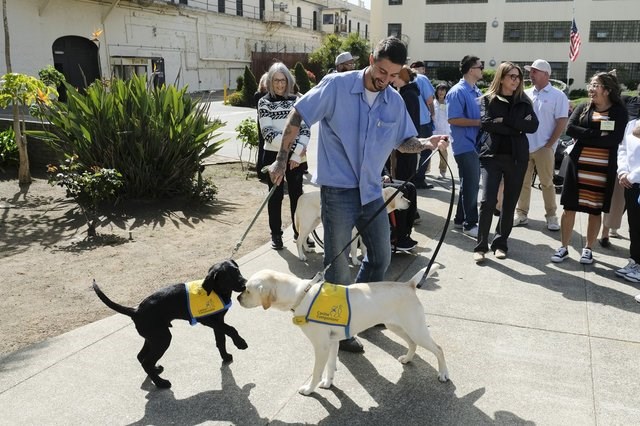Olga R. Rodriguez

Chase Benoit, who is incarcerated at the San Quentin Rehabilitation Center, holds a pair of service dogs in training in San Quentin, Calif., Friday, March 28, 2025. (AP Photo/Eric Risberg)
Republished April 01, 2025 - 1:19 PM
Original Publication Date March 31, 2025 - 9:21 PM
SAN QUENTIN, Calif. (AP) — Hugs, tears, barking and tail wagging abounded at San Quentin’s prison when two black Labradors reunited with the incarcerated men who helped raise them to be service dogs.
The emotional reunion brought together Chase Benoit, Jared Hansen and the 2-year-old dogs they helped train: Wendel and Artemis. It was the men's first time seeing their former canine companions again and their first time meeting the dogs' disabled handlers in person.
The encounter Friday in San Quentin’s main courtyard brought Benoit and Hansen full circle after helping launch the prison’s puppy training program in April 2023.
“Being in this program, it’s given me something that I think I’ve searched for my whole life,” said Benoit, who is serving 15 years-to-life for second-degree murder. “And that was meaningful purpose, doing something that’s good, better, bigger than myself and feeling like I’m part of something great.”
Robert Quigley, who is deaf, teared up after seeing his spirited dog Wendel bark and get excited when he saw Benoit, his old trainer.
“He remembers me, for sure, I could tell when he came in. I’m so happy that you love him, and that you have a bond,” Benoit told Quigley through an American Sign Language interpreter.
“He’s with me 24/7. He’s very gentle and good with people,” answered Quigley, a recent college graduate who took Wendel home in November after the black Labrador and golden retriever mix completed another six months of professional training outside prison.
Teaching pups the fundamentals in prison
Benoit and Jensen were part of an initial group of four incarcerated trainers who shared their 4 foot-by-10 foot cells with the 4-month-old puppies. The men divided the responsibility of caring for and teaching the dogs foundational commands for a year.
Canine Companions, a nonprofit based in Santa Rosa, runs the program and provides free service dogs to people with disabilities. It has built the San Quentin program to 16 trainers and two dog sitters who, as of this week, are training eight puppies.
Artemis, a black Labrador, was matched with Benjamin Carter, a veterinarian from Portland, Oregon, who uses a wheelchair, and traveled to California for the reunion.
Like proud parents, Carter and Hansen shared notes on Artemis' calm and loving personality and penchant for cuddles.
“Seeing him in action and actually serving somebody in the community, it’s just … I’m at a loss for words right now. It’s amazing!” said Hansen, who has been in prison for 15 years for bank robbery.
Artemis, or Artie, pushes door plates, pulls doors open, fetches things around the house and does many other tasks that would be hard for Carter alone.
First work, then cuddles
“He is responsive when he’s working. He is cuddly when he is off the clock. He’s an amazing companion. And all that structure and love and trust was built from these guys here, so I’m just super grateful to them,” Carter said.
The puppies are placed with incarcerated trainers when the dogs are between 2 and 4 months of age and stay with them until they are about 16 to 17 months old. Every three months the puppies are taken out for socialization experiences like interacting with children, riding in cars or going to the grocery store.
The incarcerated men teach them about 20 skills, including fetching, sitting and walking on a leash. After the dogs leave the prison, they train for several more months with professional trainers.
People incarcerated at San Quentin and who participate in the program have been convicted of crimes that include bank robberies, gun offenses and murder. Only those who are in an “earned living unit,” where residents participate in an array of self-help programs, are allowed to apply for puppy training. Inmates with records that include any animal or child cruelty crimes are not allowed to participate, said James Dern, national director of puppy programs for Canine Companions.
The value of time
Dern said dogs trained in their prison programs have a 10% greater success rate at becoming service dogs than other candidates because of the amount of time and care that incarcerated puppy raisers put into their dogs.
“Being given something to care about other than themselves and the opportunity to give back and to sort of start to make amends for the things they have done in their lives can be life changing,” Dern said.
San Quentin was once home to the largest death row population in the United States. The puppy training program started the year it transformed into a lockup where less-dangerous prisoners receive education, training and rehabilitation. Since then, another 11 correctional facilities have joined the nonprofit for a total of 24 prison institutions, Dern said.
Speaking to a crowd at the prison chapel gathered to celebrate the program, Benoit credited Canine Companions with bringing out the humanity, love and caring in the incarcerated community. "Instead of keeping it to themselves within their small community of professional trainers or even volunteer puppy raisers, they shared this with us in prison and I think that’s huge,” he said.
News from © The Associated Press, 2025